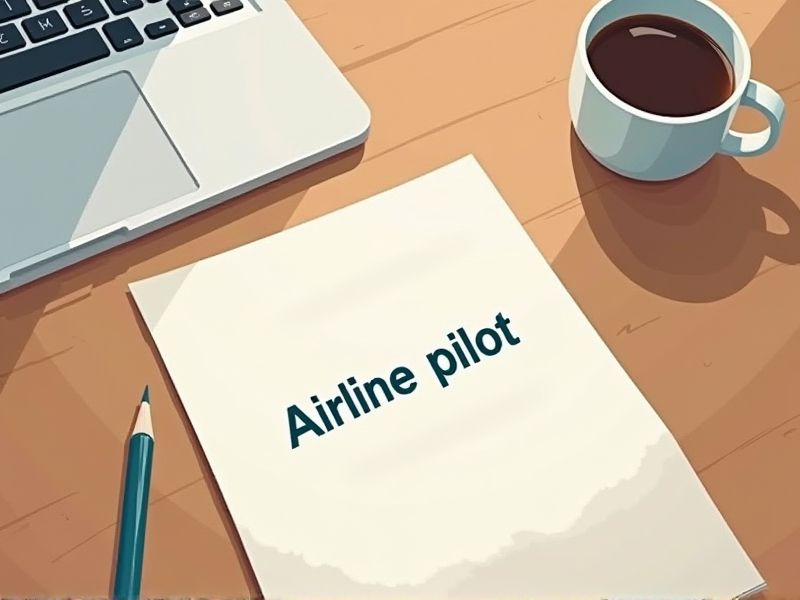
Airline pilots require specific certifications to ensure they can safely and efficiently operate complex aircraft in diverse weather conditions. These certifications provide crucial training in navigation, communication, and emergency management, ensuring passenger and crew safety. Regulatory bodies mandate these certifications to standardize pilot proficiency across the industry. Here are some important certifications you may need as an airline pilot.
Airline Transport Pilot License (ATPL)
The Airline Transport Pilot License (ATPL) is mandated for pilots to ensure they possess the highest level of knowledge, skills, and experience required for commanding commercial airliners. This licensing ensures that pilots have mastered complex aeronautical operations and decision-making, crucial for passenger safety and efficient airline operations. Regulatory bodies like the FAA and EASA set strict standards for ATPL certification to guarantee a uniform level of competency among airline pilots globally. Holding an ATPL allows pilots to be eligible for captain positions, thereby aligning with career advancement and airline promotional structures.
Commercial Pilot License (CPL)
Obtaining a Commercial Pilot License (CPL) is crucial because it certifies a pilot's competence to operate and manage aircraft safely. CPL training ensures pilots have rigorous knowledge of aviation regulations, navigation, and meteorology essential for passenger flights. The CPL demonstrates that a pilot possesses advanced skills necessary to handle complex aircraft and situations. Airlines require CPL credentials to guarantee that their pilots meet standardized safety and operational standards.
Multi-Engine Rating
Having a Multi-Engine Rating equips pilots with the skills to handle the complexity and demands of flying aircraft with more than one engine, a common characteristic of commercial airliners. Airlines prioritize hiring pilots with multi-engine experience because these pilots are familiar with managing asymmetrical thrust scenarios caused by engine failure. This rating demonstrates a pilot's proficiency in handling emergency procedures and enhances overall safety. As the aviation industry largely operates multi-engine aircraft, this qualification aligns pilots with the operational standards required by airlines.
Instrument Rating (IR)
Instrument Rating (IR) is necessary for airline pilots because it enables them to fly in varying weather conditions where visual navigation is compromised. IR enhances safety by allowing pilots to rely on instruments rather than sight, reducing the risk of accidents in poor visibility. Proficiency in instrument flying expands operational capabilities, thus increasing an airline's scheduling efficiency and reliability. Regulations mandate that airline pilots possess an IR to ensure standardized skill levels across the aviation industry.
Type Rating
Type Rating is needed for airline pilots because each aircraft type has unique systems, handling characteristics, and operational procedures that require specialized training. Regulatory agencies mandate type ratings to ensure pilots possess the proficiency to safely operate specific aircraft models. Without a type rating, pilots cannot legally fly that particular aircraft, which prevents potential safety risks due to unfamiliarity. Airlines invest in type rating to align pilot capabilities with their fleet requirements, enhancing operational efficiency and reducing insurance liabilities.
Flight Instructor Certificate
Obtaining a Flight Instructor Certificate enhances an airline pilot's understanding of aviation principles and teaching others solidifies one's own skills. The certification process helps pilots to log more flight hours, which are critical for meeting airline hiring requirements. Instructors develop sharper decision-making abilities because they must anticipate and correct students' mistakes, translating to better risk management as an airline pilot. Airlines value the leadership qualities that are honed during the instructor training, often making those with such experience more desirable candidates.
Crew Resource Management (CRM) Certification
Crew Resource Management (CRM) Certification is essential as it enhances communication and teamwork among cockpit crew members, reducing the likelihood of human error. The certification focuses on decision-making and leadership skills, which are critical in high-pressure flight situations that pilots often face. CRM fosters a culture of safety by ensuring pilots can effectively manage and utilize all available resources during flights. Studies show that CRM training significantly lowers the incidence of accidents and incidents, effectively increasing operational safety.
Upset Prevention and Recovery Training (UPRT) Certification
Airline pilots require Upset Prevention and Recovery Training (UPRT) Certification to enhance their ability to recognize and respond effectively to unexpected flight conditions that can lead to an upset. Lack of such training has been linked to several aviation accidents, contributing to the need for these specialized skills to mitigate risks. UPRT equips pilots with the knowledge to manage extreme flight scenarios, thus improving overall safety in commercial aviation. Regulatory bodies have mandated UPRT certification to address vulnerabilities in pilot training programs and to ensure a standardized approach in handling in-flight upsets.
Aviation Safety Management Certification
Aviation Safety Management Certification is crucial for airline pilots as it equips them with the necessary knowledge to identify and mitigate potential safety risks, directly impacting passenger and crew wellbeing. Certification ensures pilots are trained in industry-standard safety protocols, which enhances overall operational safety. Pilots with safety management certification contribute to a culture of safety within the airline, thereby reducing the likelihood of accidents. The certification also aligns pilots with regulatory requirements, ensuring compliance and fostering public trust in the airline's commitment to safety.
First Aid & CPR Certification
Airline pilots frequently encounter high-pressure situations where they may need to provide immediate assistance to passengers experiencing medical emergencies. First Aid & CPR certification equips them with the necessary skills to manage incidents like cardiac arrests or sudden illness until professional medical help arrives. Presence of a trained pilot can increase passenger safety and potentially save lives during flights with limited access to emergency services. Regulatory agencies often mandate such training to ensure pilots are prepared for diverse in-flight emergencies.
Summary
You can expect improved safety and operational efficiency when an airline pilot obtains additional certifications. Certified pilots enhance decision-making skills, leading to a decrease in in-flight incidents. Airline companies benefit from lower insurance premiums due to the increased reliability of certified pilots. Passengers might experience a smoother flying experience and increased trust in the airline's service.
